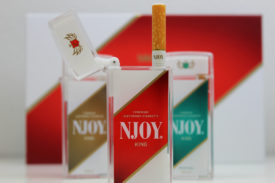Ecigarette maker NJOY is calling it quits:
The company filed for bankruptcy protection on Sept. 16 in Delaware federal court, burning some high-powered Silicon Valley investors, including Sean Parker, co-founder of the now-defunct Napster, and PayPal founder Peter Thiel, who were part of a $70 million capital round that valued NJOY at $1 billion in 2013. Singer Bruno Mars is also an investor in NJOY and a fan of the e-cigarettes, which heat nicotine-laced liquid into vapor.
Parker, who ponied up $10 million to put into the company, said at the time that electronic cigarettes had the potential to make regular cigarettes “and all the harm they cause obsolete.”
The filing comes just five months after new federal regulations from Food and Drug Administration threaten the fast-growing multibillion-dollar industry that includes tobacco giants Altria and Reynolds, which own MarkTen and Vuse, respectively.

Photo by lindsay-fox 
That being said, as a first order of effect it’s hard to blame NJOY’s fall on the FDA’s Deeming regulations. Their sales fell to a tenth of their high mark in an industry that’s growing. They failed because they had a shoddy product. Where the FDA comes in is that it turned off the light at the end of the tunnel. Without the FDA regulations, they might have been able to pivot into different products, change their focus, or any number of other things. Instead, they are going to be required to spend millions of dollars just to keep their current lackluster product on the market. And unlike Big Tobacco, they just don’t have the resources to do so.
When I talk about their product, I should clarify. Though they sell different things, NJOY focused primarily on cigalikes and closed systems. They’re not bad products exactly. I quit smoking with Blu, which was a similar product. Others, though, have found their product not remotely satisfactory as a cigarette replacement and I myself would have had a much smoother transition if I’d gone straight to vape pens or some other more efficient device. Blu is still around, though they have gone from being front-and-center at the cigarette counter to something you see down at the bottom right tucked out of the way. There may be a market for items that give a poor vape but retain the look and feel of cigarettes, but it’s likely pretty limited, and NJOY’s model seemed built around it.
Some public health advocates seem to be celebrating this development, while some pro-vape people say it portends bad things. I believe it’s mostly irrelevant. I’m not worried about NJOY. I’m worried about vape shops, independent dealers, and the like. The main thing I will miss about NJOY is that they had a good media presence and were one of the better known brands that had never been associated with tobacco companies. They were an easy company to cite when someone said that the whole thing is a front for Big Tobacco.
About the Author
4 Responses to The End of NJOYment
Leave a Reply
please enter your email address on this page.

The more I think about it, the more I believe that people have a right to take into their bodies whatever they want. The FDA needs to be relegated to an advisory body only, like Consumer Reports.
I’m certainly more amenable to this view than I used to be.
How about a cellphone/e-cig combo?
Double the battery explosions?